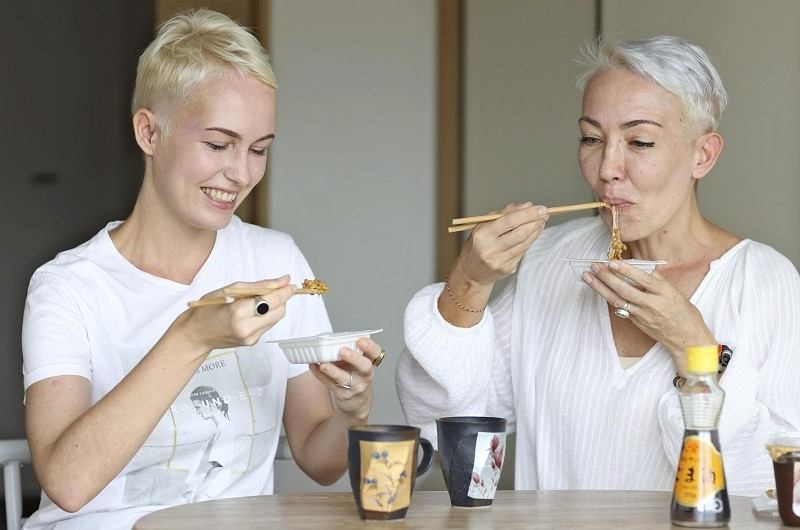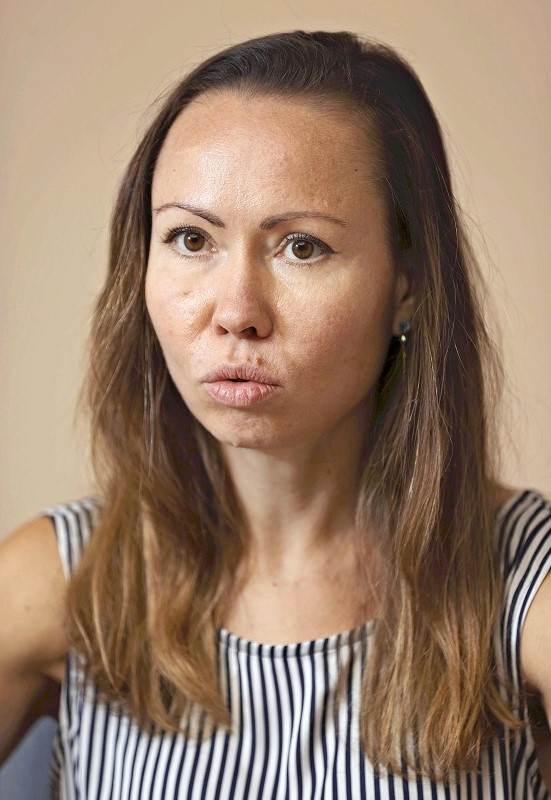Ukrainian refugees positive about life in Japan despite financial difficulties, new schools, learning Japanese

Natalya Nesterenko, right, and her daughter Anastasiia Sokha eat Tuesday in their apartment in Adachi Ward, Tokyo.
6:00 JST, August 26, 2022
Following Russia’s invasion of Ukraine, a total of 1,775 Ukrainian refugees had entered Japan by Aug. 21, according to the Immigration Services Agency. On the same day, 1,708 of them were living in 45 prefectures across the nation, though some had already returned to Ukraine. They are trying to build a new life in Japan, even while perplexed by cultural and language differences.
On March 2, about a week after the invasion started, the Japanese government announced that it would accept refugees from Ukraine. Since transporting 20 Ukrainian refugees wishing to come to Japan by government plane from Poland in early April, the government has continued to accept Ukrainian refugees by paying for seats on direct commercial flights from Poland.
The refugees enter Japan on a 90-day short-term visa. If they wish, they can change to a one-year Designated Activities visa that makes employment possible. They are also allowed to renew the visa.
A total of 1,474 refugees — which accounts for nearly 90% of the total number of Ukrainians fleeing Russia’s invasion to enter Japan — have already changed their visas to Designated Activities.
Tokyo has the largest number of refugees among all prefectures with 370, followed by Kanagawa with 115, and Fukuoka with 105.
Lacking money for food
Natalya Nesterenko and her eldest daughter Anastasiia Sokha came from Kharkiv in eastern Ukraine. When Russia’s invasion began, they were on a trip to Indonesia and were unable to return home. When their money ran out, they came to Japan in June, with their travel expenses paid by a Ukrainian friend living in Japan. Now they live in an apartment in Tokyo’s Adachi Ward that is managed by the Tokyo metropolitan government.
In July, Nesterenko, 48, a psychotherapist, resumed online counseling for her Ukrainian clients who remain in the country. Sokha, 29, also started working online as a graphic designer.
However, their combined income stands at about ¥150,000 a month. When they lack money for food and necessities, they make up the difference with part of a lump sum payment of ¥100,000 per person they received from the Adachi Ward Office.
To cut down on food costs, they sometimes eat natto fermented beans for breakfast, lunch and dinner. At first they did not like it, but now natto has become their favorite food. Their current concern is Nesterenko’s mother, who still lives in a suburb of Kharkiv. Every time Nesterenko watches news footage of the attacks, she worries about her mother.
“I wish many times I could go back to my life before the invasion,” Nesterenko said in tears. “What I can do now is to learn Japanese, live vigorously and keep my physical and mental health in a good state.”
Gratitude for support

Olha Zhuravel
In mid-March, Olha Zhuravel left Kyiv for Japan with her 20-year-old daughter, 11-year-old daughter and 8-year-old son. Zhuravel, 44, decided she had to protect her children’s lives when Russian forces took over a nuclear power plant.
Asking her friend living in Tokyo to be their guarantor, they initially took shelter at her friend’s house. Later, they moved to an apartment in Chiyoda Ward, Tokyo, lent by a real estate company in Tokyo offering free accommodation for Ukrainian refugees. The Nippon Foundation in Tokyo supports their living expenses.
Her younger daughter and son started attending the same elementary school in April. Her son became so stressed by the unfamiliar environment that he sometimes hid Zhuravel’s smartphone to get his mother’s attention or suddenly started crying on the train.
Zhuravel said: “I was bewildered by the changes in my children. But they have become accustomed to life in Japan and have gradually settled down. We’re grateful for all the support we have received here.”




